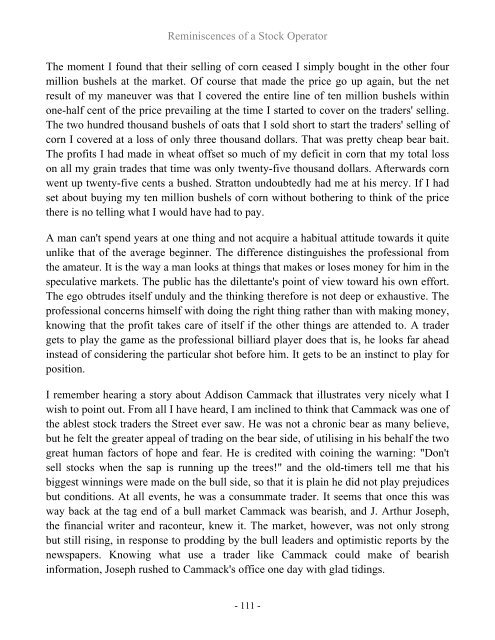Create successful ePaper yourself
Turn your PDF publications into a flip-book with our unique Google optimized e-Paper software.
Reminiscences of a Stock Operator<br />
The moment I found that their selling of corn ceased I simply bought in the other four<br />
million bushels at the market. Of course that made the price go up again, but the net<br />
result of my maneuver was that I covered the entire line of ten million bushels within<br />
one-half cent of the price prevailing at the time I started to cover on the traders' selling.<br />
The two hundred thousand bushels of oats that I sold short to start the traders' selling of<br />
corn I covered at a loss of only three thousand dollars. That was pretty cheap bear bait.<br />
The profits I had made in wheat offset so much of my deficit in corn that my total loss<br />
on all my grain trades that time was only twenty-five thousand dollars. Afterwards corn<br />
went up twenty-five cents a bushed. Stratton undoubtedly had me at his mercy. If I had<br />
set about buying my ten million bushels of corn without bothering to think of the price<br />
there is no telling what I would have had to pay.<br />
A man can't spend years at one thing and not acquire a habitual attitude towards it quite<br />
unlike that of the average beginner. The difference distinguishes the professional from<br />
the amateur. It is the way a man looks at things that makes or loses money for him in the<br />
speculative markets. The public has the dilettante's point of view toward his own effort.<br />
The ego obtrudes itself unduly and the thinking therefore is not deep or exhaustive. The<br />
professional concerns himself with doing the right thing rather than with making money,<br />
knowing that the profit takes care of itself if the other things are attended to. A trader<br />
gets to play the game as the professional billiard player does that is, he looks far ahead<br />
instead of considering the particular shot before him. It gets to be an instinct to play for<br />
position.<br />
I remember hearing a story about Addison Cammack that illustrates very nicely what I<br />
wish to point out. From all I have heard, I am inclined to think that Cammack was one of<br />
the ablest stock traders the Street ever saw. He was not a chronic bear as many believe,<br />
but he felt the greater appeal of trading on the bear side, of utilising in his behalf the two<br />
great human factors of hope and fear. He is credited with coining the warning: "Don't<br />
sell stocks when the sap is running up the trees!" and the old-timers tell me that his<br />
biggest winnings were made on the bull side, so that it is plain he did not play prejudices<br />
but conditions. At all events, he was a consummate trader. It seems that once this was<br />
way back at the tag end of a bull market Cammack was bearish, and J. Arthur Joseph,<br />
the financial writer and raconteur, knew it. The market, however, was not only strong<br />
but still rising, in response to prodding by the bull leaders and optimistic reports by the<br />
newspapers. Knowing what use a trader like Cammack could make of bearish<br />
information, Joseph rushed to Cammack's office one day with glad tidings.<br />
- 111 -


